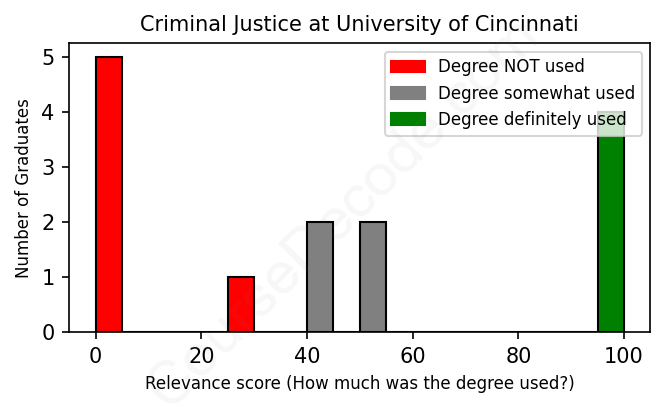
First, some facts. Of the Criminal Justice graduates from University of Cincinnati we've analyzed , here's how many have used (or NOT used) their degree in their career:

These are estimates based on AI analysis of 14 LinkedIn profiles (see below).
The verdict? Bad. Overall, with an average relevance score of 44%, Criminal Justice graduates from University of Cincinnati have a substantially lower likelihood (-23%) of finding work in this field compared to the average graduate across all fields:
And for comparison, here's the chart for all profiles we've looked at across all degrees.
Also, after graduating, only 21% of these graduates have pursued further education other than another Bachelor's degree (such as a Masters degree or other), compared to the average across all profiles of 35%. This suggests a Bachelors degree is enough for most Criminal Justice graduates, and it's normal to look for work straight after graduation.
See the details:
|
Relevance score: 44% We think this person has gone into a career only somewhat relevant to their degree. We think this person has gone into a career only somewhat relevant to their degree.
DEGREE INFOGraduated in 2015 from University of Cincinnati with a Bachelor's Degree in Criminal Justice. No other secondary education since. JOB HISTORY SINCE GRADUATIONAccount Executive PLS Logistics Services Jun 2016 - Nov 2016 Account Manager & Executive Recruiter : Construction & Facility Maintenance  Tech USA Nov 2016 - Sep 2018 Account Manager & Executive Recruiter : Transportation & Industrial Molders  KLA Industries Sep 2018 - May 2020 ABOUTKLA Industries was founded in 1999 as a search firm dedicated solely to recruiting technical, sales, R&D, and manufacturing management talent for the plastics industry. Since then, KLA has become the most networked search firm in the industry, and the one to count on when you cannot afford to hire the wrong person.We are also the largest search firm in the US that works only in the plastics manufacturing and polymer technology space. To best serve our clients, we are organized into 4 divisions:1. Packaging2. Machinery3. Plastic Processors4. MaterialsIn addition to being deeply niched in the Plastics community, which includes membership in the Society of Plastics Engineers, we also enjoy the highest reputation within the recruiting industry.When you are partnering with a recruiter, they are representing your company to the talent marketplace in a way that no one else can. Because we are members of the National Association of Personnel Services (NAPS), and our consultants are certified through that organization, you can be assured that we know the laws involved in the hiring process and will represent your company with the highest level of compliance and integrity. [EMAIL REMOVED]727.315.4722 |
The top 10 most common jobs done by the graduates we've analyzed (ranked most common to least) are:
When looking at the career paths of folks who have graduated with a Criminal Justice degree from the University of Cincinnati, it’s clear that there’s a mix of relevant and unrelated jobs. Many graduates found their way into legal roles, such as legal interns, law clerks, or even prosecutor positions. These jobs directly apply knowledge from their studies and are heavily related to the field of Criminal Justice. Positions in law enforcement, like police officers and parole officers, also show up fairly often, indicating that many graduates are pursuing careers that align well with their degree.
However, not all graduates stayed in fields closely tied to Criminal Justice. Many ended up in roles that don’t require this background at all, such as sales representatives, bartenders, and various other positions in hospitality or business. It’s a bit of a mixed bag—while some graduates are leveraging their education in meaningful ways, a significant number have wandered into careers that have little to do with criminal justice principles or practices. So, it really depends; if you’re thinking about a Criminal Justice degree, you might want to explore how to stay connected to that field after graduation.
Here is a visual representation of the most common words in job titles for Criminal Justice graduates (this is across all Criminal Justice graduates we've analyzed, not just those who went to University of Cincinnati):

Looking at the career trajectories of graduates from the University of Cincinnati with a degree in Criminal Justice, there's a mixed bag of outcomes. Right after graduation, many of them found themselves in roles that are pretty closely related to criminal justice or legal fields, like internships at public defender offices or with police departments. These initial jobs set the stage for building relevant experience in their chosen career paths. However, as time goes on, we see that not everyone sticks to the criminal justice track. Some graduates have drifted into various roles that are less directly related to their studies, such as sales positions and management roles at restaurants or in other industries.
Five to ten years down the line, it's apparent that while some have established themselves in solid criminal justice careers — like prosecutors or law enforcement officers — others have taken quite a different route, finding themselves in totally unrelated sectors. It's a bit of a mixed picture: while some have successfully carved out careers in fields relevant to their degrees, many are working in jobs that don’t utilize their criminal justice training at all. So, if you're considering this degree, it's worth noting that while there are opportunities in criminal justice, the path can vary significantly from person to person, and being open to different career options may also serve you well.
Honestly, a Bachelor’s degree in Criminal Justice, including at the University of Cincinnati, is generally considered to be on the easier side compared to some other majors. You’ll definitely have to put in some effort—there's reading, writing, and a good amount of research involved—but it tends to be more about understanding theories and concepts rather than crunching complex math or diving deep into science, which can trip a lot of students up. Plus, a lot of the material can be pretty interesting if you’re into crime, law, and society. So, if you can stay organized and keep up with the assignments, you should do just fine!
Most commonly, in the LinkedIn profiles we've looked at, it takes people 4 years to finish a Bachelor degree in Criminal Justice.
Looking at these Criminal Justice grads from the University of Cincinnati, it seems like their financial outcomes vary a lot. For example, the legal-focused grad who graduated in 2011 seems to have moved up the ranks to become a Deputy Prosecutor, which usually pays pretty well in the legal field. On the other hand, the 2012 grad who has been a bartender and in various non-security jobs might not be making as much money, especially starting out in roles like pharmacy intern or event bartender. Meanwhile, the recent graduates are just starting their careers, so it’s hard to say where they'll end up financially. Overall, some of these folks seem to be on promising paths with potentially decent salaries, while others might be still working to find their financial footing.
Here is a visual representation of the most common words seen in the "about" section of LinkedIn profiles who have a Bachelor degree in Criminal Justice (this is across all Criminal Justice graduates we've analyzed, not just those who went to University of Cincinnati). This may or may not be useful:

Here are all colleges offering a Bachelor degree in Criminal Justice (ordered by the average relevance score of their Criminal Justice graduates, best to worst) where we have analyzed at least 10 of their graduates: